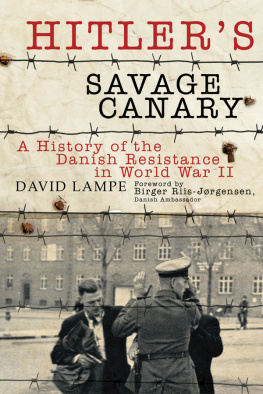An Official History - SOE in Denmark: The Special Operations Executives Danish Section in WW2
Here you can read online An Official History - SOE in Denmark: The Special Operations Executives Danish Section in WW2 full text of the book (entire story) in english for free. Download pdf and epub, get meaning, cover and reviews about this ebook. year: 2021, publisher: Pen & Sword Books Limited, genre: Religion. Description of the work, (preface) as well as reviews are available. Best literature library LitArk.com created for fans of good reading and offers a wide selection of genres:
Romance novel
Science fiction
Adventure
Detective
Science
History
Home and family
Prose
Art
Politics
Computer
Non-fiction
Religion
Business
Children
Humor
Choose a favorite category and find really read worthwhile books. Enjoy immersion in the world of imagination, feel the emotions of the characters or learn something new for yourself, make an fascinating discovery.
- Book:SOE in Denmark: The Special Operations Executives Danish Section in WW2
- Author:
- Publisher:Pen & Sword Books Limited
- Genre:
- Year:2021
- Rating:5 / 5
- Favourites:Add to favourites
- Your mark:
SOE in Denmark: The Special Operations Executives Danish Section in WW2: summary, description and annotation
We offer to read an annotation, description, summary or preface (depends on what the author of the book "SOE in Denmark: The Special Operations Executives Danish Section in WW2" wrote himself). If you haven't found the necessary information about the book — write in the comments, we will try to find it.
Denmark is composed of a mainland and more than 500 islands, a fifth of which are inhabited, and the countryside is devoid of any inaccessible or mountainous region. Together this made communication between resistance cells difficult and meant that there were no natural bases from which guerrilla operations could be mounted. Nevertheless, thanks to supply drops of explosives, weapons and ammunition arranged by SOE, the Danes harassed the Germans and raised the moral of the Danish people in the latter, and most brutal, stages of the war.
This largely forgotten story of SOE and its agents in Denmark, the latter facing extremely hazardous conditions, was written immediately after the war by a SOE staff member and read and validated by the Director of SOE, Major General Colin Gubbins. A very large number of documents were burned at SOEs London headquarters in Baker Street when the organisation was wound down in 1946 making this history of the Danish Section an invaluable and irreplaceable study.
SOE in Denmark was written at a time when SOE was still largely unknown to the general public and its operations a closely guarded secret. It was expected that its activities would never be officially acknowledged and the study of its actions in Denmark was compiled with the aim of provide a lasting record of its achievement. Within its pages we read of the dangers the agents faced, the logistical mountains they had to overcome, and the successes achieved in the face of a ruthless enemy. Completed with unique photographs from the Danish archives, SOE in Denmark is an essential addition to the SOE literature.
An Official History: author's other books
Who wrote SOE in Denmark: The Special Operations Executives Danish Section in WW2? Find out the surname, the name of the author of the book and a list of all author's works by series.













